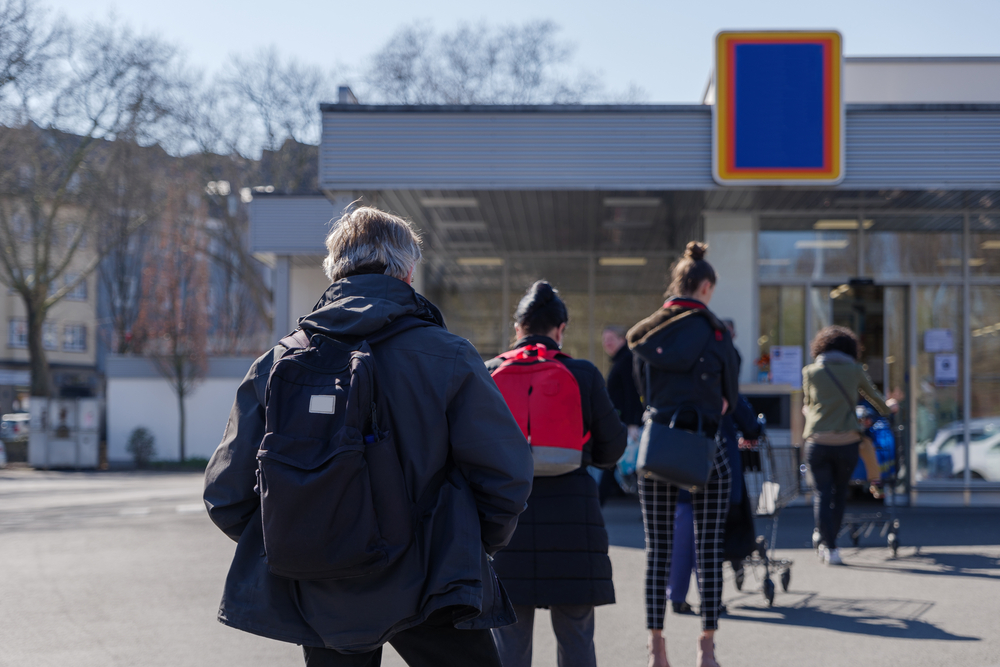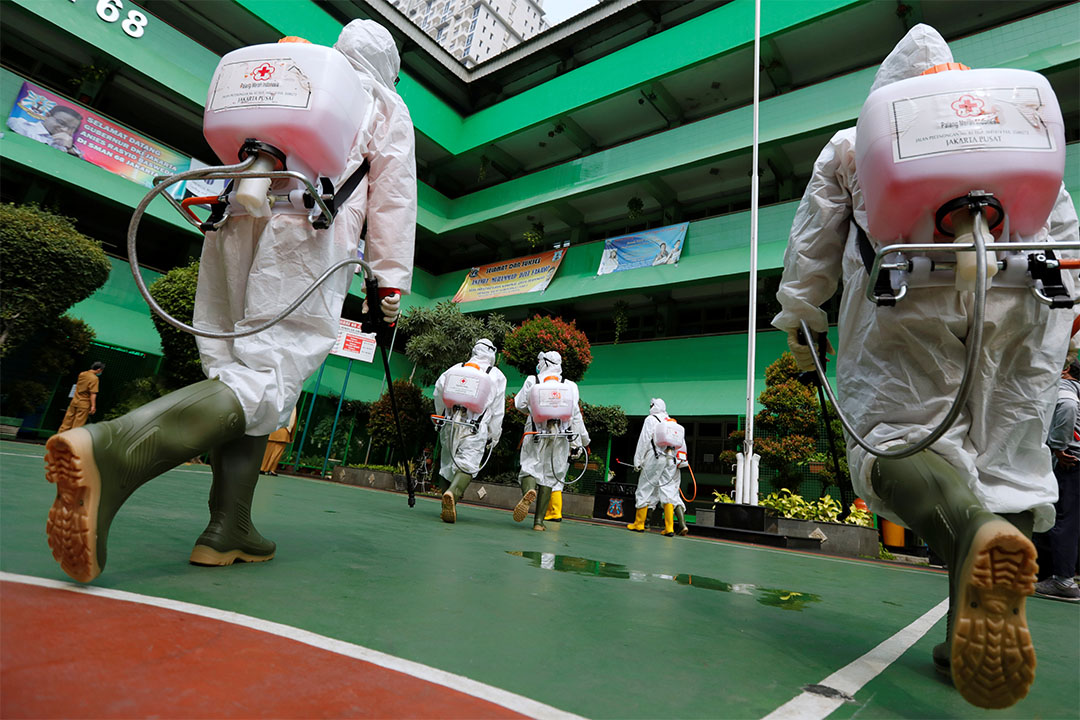
Angela Merkel is generally not an alarmist. But in a 23 April speech to parliament, the German chancellor warned that the country's push to ease coronavirus restrictions was a dangerous game. "Let's not gamble away what we've achieved and risk a setback," she urged.
Her real audience wasn't the members of the Bundestag, seated 2 meters apart, but the leaders of the German Länder, or states. Like governors in the United States, these regional leaders have the power to decide whether and when to reopen schools, shops, churches, and cafes—and several think it's time. Many schools and shops reopened last week, with more to come in early May. But Merkel, like many of the country's scientists, has pushed back, saying additional weeks of tight restrictions are needed to drive COVID-19 cases lower. "It is the right thing to do to lift some restrictions," Merkel emphasized. "But the way some states are going forward is rather brisk," she said. "I would say too brisk."
The debate is a familiar one in many countries that are seeing dropping numbers of new COVID-19 cases and deaths. But Germany stands out in two respects. It has done an exemplary job of managing its epidemic so far, earning plaudits from the World Health Organization (WHO). And one small, unpublished study in a hard-hit German town has fueled the calls to reopen society, by suggesting the virus is less deadly than thought and that a large fraction of the population may already be immune to it.
Many things have played in Germany's favor so far. A team led by Christian Drosten at Charité University Hospital in Berlin developed the world's first diagnostic test for SARS-CoV-2 in mid-January, which was quickly shared worldwide. After a cluster of cases in Bavaria in late January showed how easily the virus spreads, Germany ramped up testing earlier than most countries, helped by a wide, decentralized network of diagnostic labs. In March, the country shut down public life in time to avoid the overwhelmed hospitals and sobering death tolls of Italy, France, Spain, and Switzerland. (Most hospitals are operating well below capacity, and many have welcomed patients from overburdened hospitals in Italy, France, and the Netherlands.) So far, Germany has had just over 152,000 confirmed cases, but only 5500 deaths, far fewer per capita than most European countries. About 2000 new cases are now diagnosed every day, down from 5000 in mid-March.
The success has made some leaders question whether restrictions are still justified. The idea "is to lift restrictions step by step and see what happens," says Jonas Schmidt-Chanasit, a virologist at the Bernhard Nocht Institute for Tropical Medicine. "The price you pay for this strategy … is that you have to do this for a really long time," says Michael Meyer-Hermann, a modeler at the Helmholtz Centre for Infection Research. How long is not clear, given questions about how changing weather will affect spread of the virus and how much immunity people will build up.
Merkel, Drosten, and Germany's federal disease control agency, the Robert Koch Institute, have argued—even pleaded—for a different course: keeping most restrictions in place until the virus is "dried out." Otherwise the country risks a second wave of infections that could be more ferocious than the first, Drosten says, because SARS-CoV-2 has spread across the country and could explode everywhere at the same time. In that case, a second shutdown would be unavoidable.
"If you can get new cases low enough that you can follow everyone," Schmidt-Chanasit explains, health authorities can isolate all their contacts, ideally keeping the virus under control for the longer term. Germany does not have the capacity to do contact tracing at the current number of patients, but waiting a few more weeks might bring the daily caseload to a manageable level and also allow time to develop a phone app to aid contact tracers, Drosten says.
Schmidt-Chanasit agrees the latter option would "theoretically be the safer way." But there's no guarantee that 3 or 4 more weeks of strict restrictions will bring numbers down far enough to really trace all contacts, he warns. "And even if I would prefer to go that way, it also has significant trade-offs."
The harm to the economy, for instance, accelerates as the shutdowns drag on, says Marcel Fratzscher, head of DIW Berlin, an economic research institute: "With every week the risk of bankruptcy rises for a company." Nevertheless, "It is prudent also economically, to be very cautious," Fratzscher says, because a second shutdown would likely be worse economically than extending the first one a few more weeks.
Data not available
A study by virologist Hendrik Streeck from the University of Bonn and his colleagues has moved the needle toward reopening now. At a 9 April press conference, Streek and his colleagues announced that, based on combined antibody and virus tests of about 500 people, 15% of inhabitants of the hard-hit small town of Gangelt in western Germany had already been infected with SARS-CoV-2, and now had immunity to the virus—about three times the number who had been officially diagnosed. The scientists said that means COVID-19 has a death rate of only 0.37%, and that Gangelt is already "on its way to herd immunity," a level of immunity in the population in which a disease is no longer able to spread. They added that because "strict hygiene measures" generally would reduce the dose of virus an infected person passes on, most future cases could be expected to be mild—while still leading to protective immunity. They concluded that many restrictions could be safely lifted.
But the researchers did not present any data to support their claim that hygiene will reduce the risk of severe disease. Other researchers have questioned the rapid antibody test used in the study because it can produce significant numbers of false positives. And as WHO noted this week, the presence of antibodies does not necessarily mean someone is fully immune to COVID-19.
Streeck, who did not respond to multiple requests for comment from Science has long questioned how serious COVID-19 really is, tweeting that WHO's decision to declare a Public Health Emergency of International Concern in January was a mistake. He has told viewers of several talk shows in the past week that a vaccine is so far off that inevitably "most of the population will be infected" with the virus.
The Gangelt study had political overtones from the start. It was funded in part by the state of North Rhine-Westphalia, whose minister president, Armin Laschet, has been an outspoken advocate of lifting restrictions. And publicity was managed by a public relations firm linked to German industry. At the 9 April press conference, Laschet praised the work and said it would play an important role at a 15 April meeting between Merkel and state leaders to discuss how and when to relax restrictions.
Reports from that meeting suggest Laschet pushed hard to lift restrictions. An anonymous source quoted Merkel complaining about an "orgy of when-to-open-up discussions." In the end, leaders decided to allow small stores to open and some secondary school students to return to classes and final exams. In May, churches will be allowed to hold services with limited numbers of participants. North Rhine-Westphalia went further than many other regions, allowing larger stores to reopen. Laschet is pushing for a plan that would allow hotels and restaurants back into business as well.
Although some 200 people protested against the shutdown measures in Berlin the past weekend, polls suggest a majority of Germans still accept and mostly follow current restrictions, says Cornelia Betsch, an expert in health communication at the University of Erfurt who, along with colleagues, has been conducting weekly polls of 1000 people about their knowledge of and opinions on COVID-19. "Most of the pressure for opening up is coming from business leaders," rather than from the general public, she says. However, she notes, in recent weeks concern about the economy—and that the crisis will increase inequality—has stayed very high, while concerns about overwhelming the health system have dropped.
Drosten fears the German states may now be making decisions that will come back to haunt the country, and he laments the role Streeck's announcement played. The full study still isn't available to be evaluated and discussed by scientists, he notes. "That data just should not be in the public yet like this," Drosten says. "I think that has destroyed our chances of becoming a European South Korea."
COVID-19 Update: The connection between local and global issues–the Pulitzer Center's long standing mantra–has, sadly, never been more evident. We are uniquely positioned to serve the journalists, news media organizations, schools, and universities we partner with by continuing to advance our core mission: enabling great journalism and education about underreported and systemic issues that resonate now–and continue to have relevance in times ahead. We believe that this is a moment for decisive action. Learn more about the steps we are taking.










